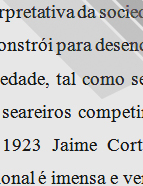

................................
Seara Nova is not a publication intended to reveal historical collaborations, nor is History, as a specific field of knowledge, a concern of those who write and engage with the magazine. However, h istory occupies a prominent position in the thinking of the seareiros (contributors to the Seara Nova publication). This is because History cannot be pushed to the background or underestimated when an interpretive view of society as a whole is sought, and especially when this view is constructed to trigger reformative public intervention. Taking society as it is interpreted as a starting point involves a view of the pas t and t herefore, it was the responsibility of the seareiros to reread and reinvent the explanations required. As early as 1923, Jaime Cortesão demonstrated the importance of history: “There is an enormous national crisis with deep roots. Portugal, which was once one of the most glorious nations in the world, is today experiencing considerable disrepute abroad. The current state of the art in Portuguese historical studies allows us to affirm that the organization of social classes through work, a strong social discipline, and a large elite of politicians, scholars, artists, and men of action educated in the school of hard experience and sacrifice are at the root of that past splendour ” (Cortesão, Intuitions, pp. 5-6). A broad range of today's issues and difficulties have roots in the past, which need to be understood in order to be corrected and overcome.
The prevailing interpretation of the History of Portugal among Portuguese intellectuals when Seara Nova was first published, in October 1921, was still based on Oliveira Martins (with roots in Herculano), both in História de Portugal [History of Portugal] (1879) and Portugal Contemporâneo [Contemporary Portugal] (1881). This implied a view of the homeland as a victim of a decadent State, a depression that grew and worsened over the centuries after the golden period of the 15th century and the first half of the 16th century had ended. This was in line with the seareiros reformists’ assessment of contemporary Portuguese society, a vision they wished to refine to bring their reforming efforts to fruition .
